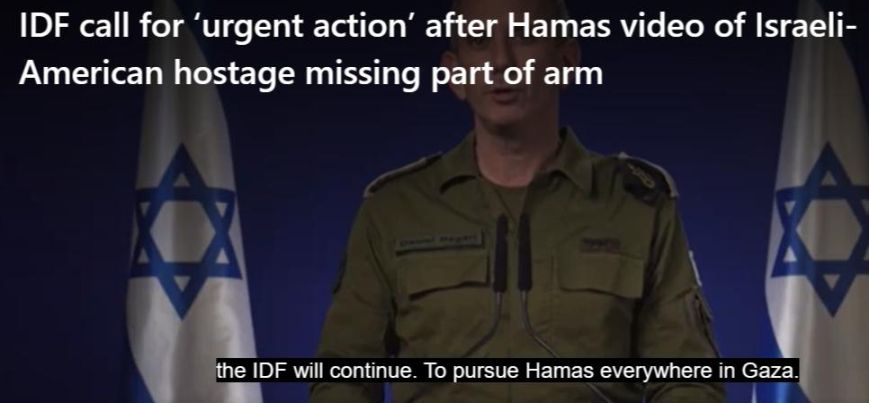By Eric Vandenbroeck and co-workers
The One Person Who Is Blocking The
Release Of Israeli Hostages
Yahya Sinwar, the Hamas
leader, is blocking a deal to release Israeli hostages, the Biden
administration has said.
An agreement to
release the 133 hostages depended on “one guy”, an unnamed official said, in a
change of tone from previous White House statements that have suggested that Benjamin
Netanyahu, the
Israeli prime minister, is delaying the process.
It came as 18 world leaders, including Rishi
Sunak and Joe Biden, signed a joint letter urging Hamas to release the captives it has held for more than 200
days.
Last week, U.S. Rep. Steny Hoyer accused Qatar of
blocking negotiations with the Hamas leader, essentially abusing its role as a
mediator. He was the fifth lawmaker to urge Congress to scrap Qatar’s status as
a major non-NATO ally granted to the Arab nation in 2022.
“Qatar needs to make
it clear to Hamas that there will be repercussions,” Hoyer said in a statement. Earlier this month, Republican
Sens. Ted Budd, Joni Ernst, and Rick Scott introduced a bill that would require the United States to conduct
a review to “terminate the designation” if Qatar didn’t expel or extradite
Hamas’s leadership, “including Ismail Haniyeh, Khalil al-Hayya, Khaled Mashal,”
its biggest leaders.
While Israel expects
Qatar to convince Hamas to release hostages and then intends to resume the war
to eliminate the group from Gaza, Qatar finds merit in Hamas’s demand of a
permanent cease-fire. This is the crux of the disagreement between Qatar and
Israel.
“I don’t think it’s
an unreasonable request,” said an Arab official familiar with the negotiations.
“If they release all hostages, they want an end to the war.”

However, the Israeli
security community suspects that’s not all Hamas wants. They argue it could
have achieved an end to the war had it agreed to disarm and leave Gaza.
Israelis fear that Hamas wants to return to Gaza, victorious, and carry out
more attacks that match the cruelty of Oct. 7.
“We can’t hand Hamas
a victory,” said Eran Lerman, a former Israeli deputy national security
advisor. “After what they have done, we refuse to live with Hamas as our
neighbors. And it’s not just Netanyahu, but there is wide support for the
policy to eradicate Hamas.” Israel is ready to offer only a temporary
truce until Hamas has been vanquished.
Doha makes the case
that since the war has limited its ability to send aid to Gaza, it simply
doesn’t have the kind of leverage it once did over Hamas’s leaders holding the
hostages inside Gaza.
“Sinwar will rather
die inside Gaza than agree to a deal to leave,” said an Arab official aware of
the negotiations, referring to Yahya Sinwar, the Hamas leader within Gaza who
was behind the Oct. 7 attack. “This is the mistake—this is what Israelis are not
understanding.”
He said that
threatening to kick out Hamas’s political leaders from Qatar will not bring the
desired pressure on Hamas. Sinwar, who is making the final decisions about the
hostage negotiations, doesn’t care about his group’s political representatives
or where they live, “whether in Qatar, Turkey, Oman, or Iran.”
Israel also doesn’t
care where Hamas’s leaders reside and has already declared that
it will hunt them down wherever
they may choose to hide. But Israeli leaders say that in the short term, they
are focused on bringing back the hostages and eliminating Hamas.
Lerman said that
Egypt has already been partly involved in negotiations, noting that it could
become a single point of communication with Hamas if Qatar doesn’t succeed in
mediating the release of the hostages in exchange for a temporary truce not a
permanent cease-fire. “It’s not like we won’t be left with a channel of
communication,” he said. “If Qatar cannot live up to its claim, that it has
leverage over Hamas, then what’s the point?”
Some in the Israeli
security community believe that once the long-expected
Rafah operation has
been successfully carried out and all of Gaza brought under Israeli occupation,
Hamas’s leaders and members would be in for a run for their lives and more
inclined to accept a deal on Israeli terms.
“Hamas will feel a
very different kind of threat than they feel now—that will change their minds,”
Lerman said.
It’s a tricky gamble.
If Qatar walks out, Israel risks losing a mediator with more influence over
Hamas than any other Arab state, and if Doha fails in ensuring safe hostage
release, it may damage its ties with the United States. Thus far, neither
side is willing to concede, and negotiations will likely go down the wire,
further procrastinating the homecoming of the more than 130 Israelis believed
to remain in Gaza.
Families of
hostages have said that they want their loved
ones released “despite the difficult price,” but they also don’t
want Hamas to live next door, preferably.
“I prefer if there is
a solution,” Gilboa said. “Maybe Hamas’s leaders can move to Qatar and live
there.”
For updates click hompage here